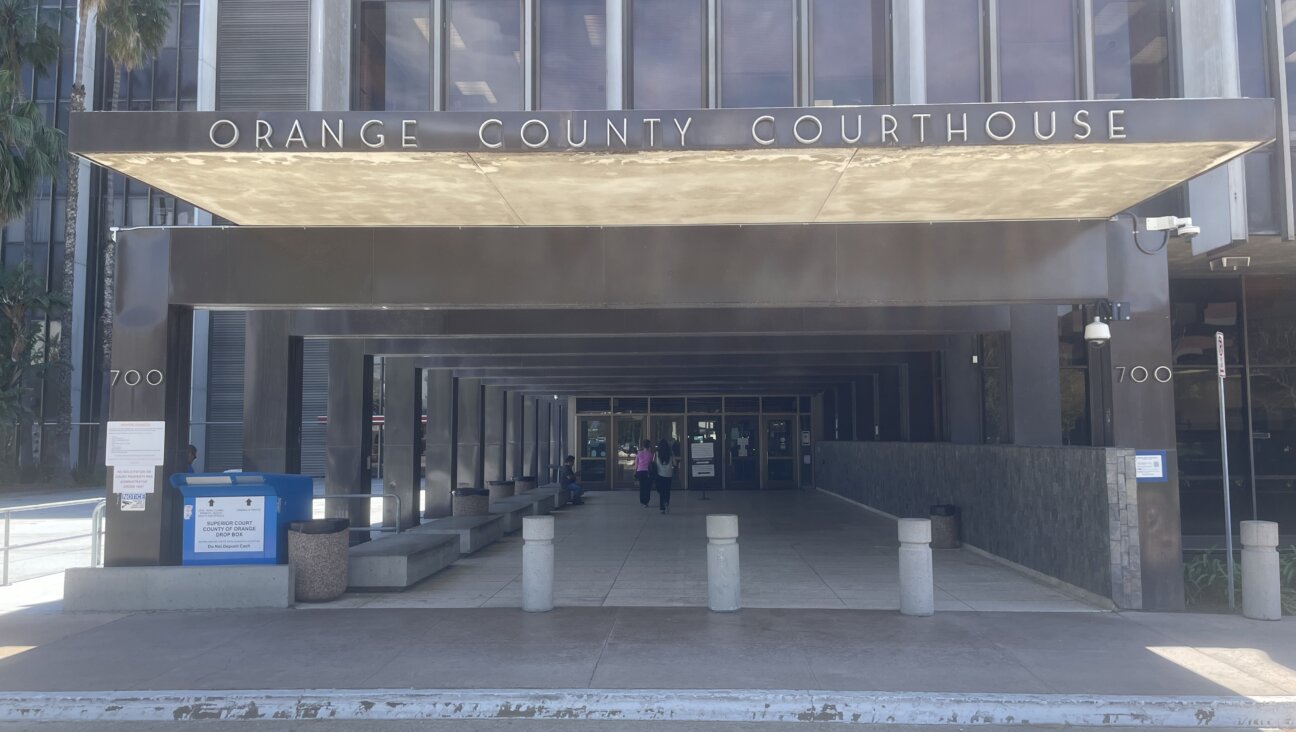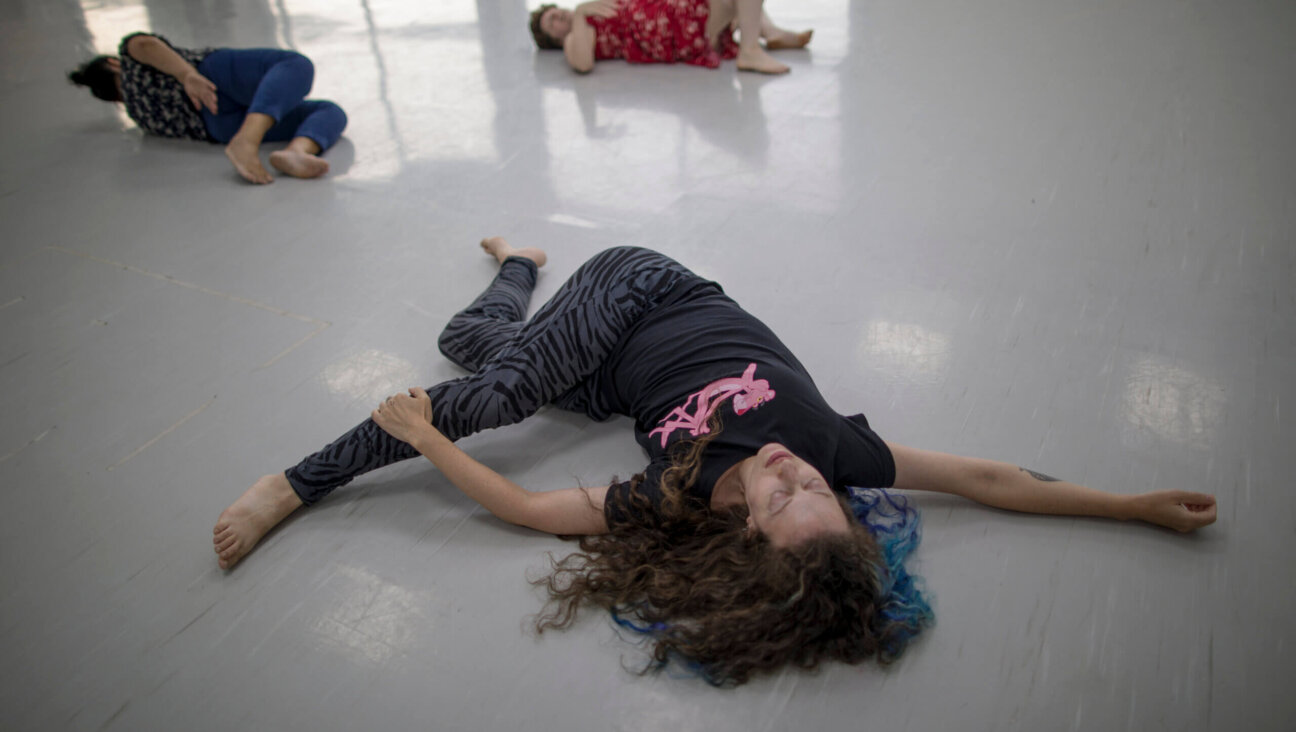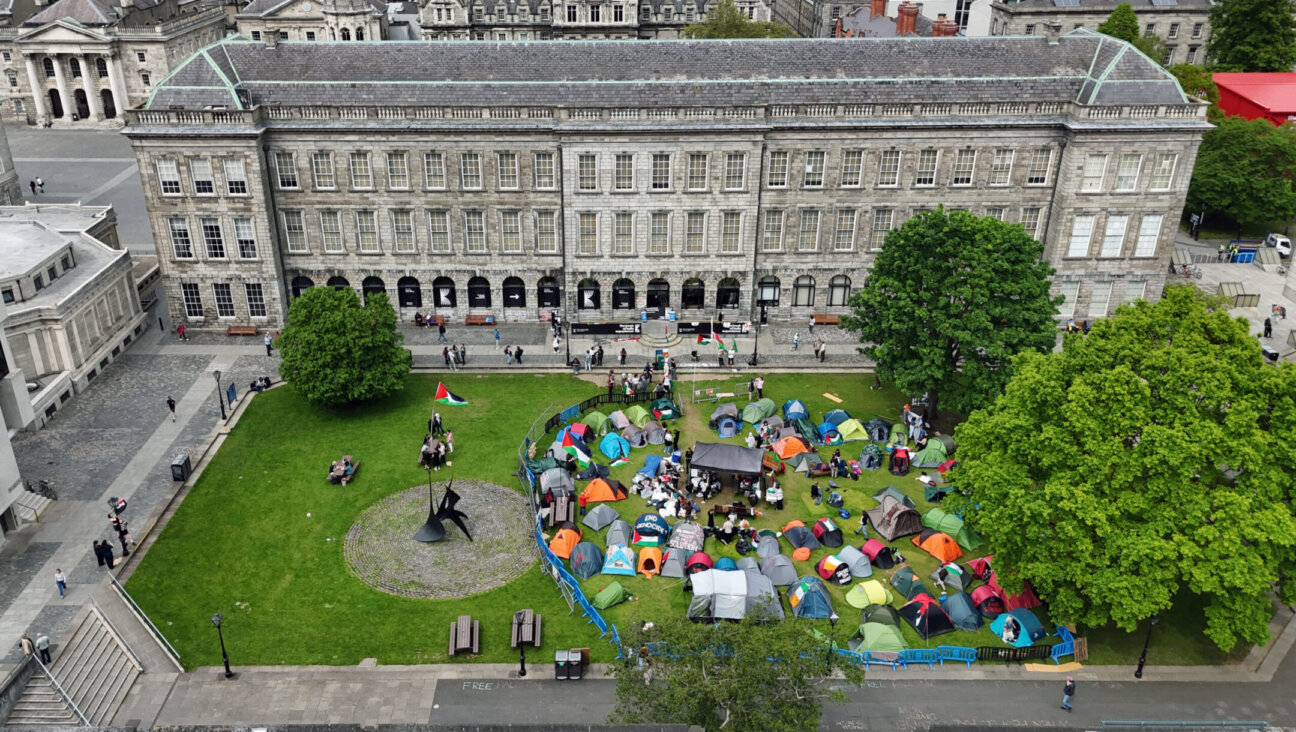A ‘quite religious’ anti-Zionist: Meet the Jewish Columbia student who wrangled the college newspaper’s opinion page
Milene Klein said she worked to present a multitude of views on the protests and the war in Gaza
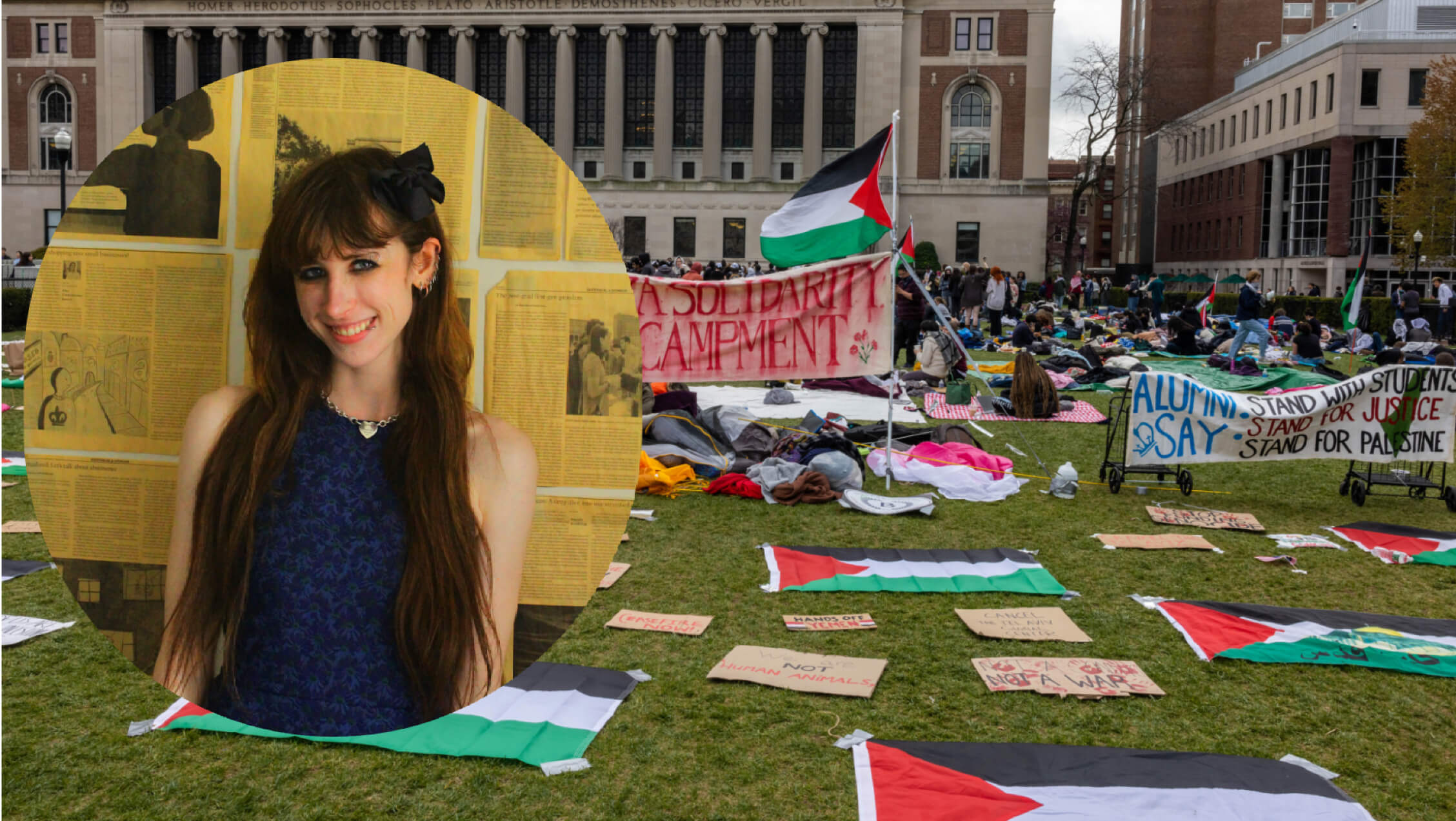
Milene Klein, the former chief of the opinion desk at the Columbia Spectator, and the campus in April 2024. Photo by Alex Kent/AFP via Getty Images and courtesy of Milene Klein
Milene Klein is Jewish, anti-Zionist, and in the months after Oct. 7, served as the top opinion editor at the Columbia Spectator, the vaunted student newspaper that became a window into the pro-Palestinian protest movement still roiling colleges across the nation.
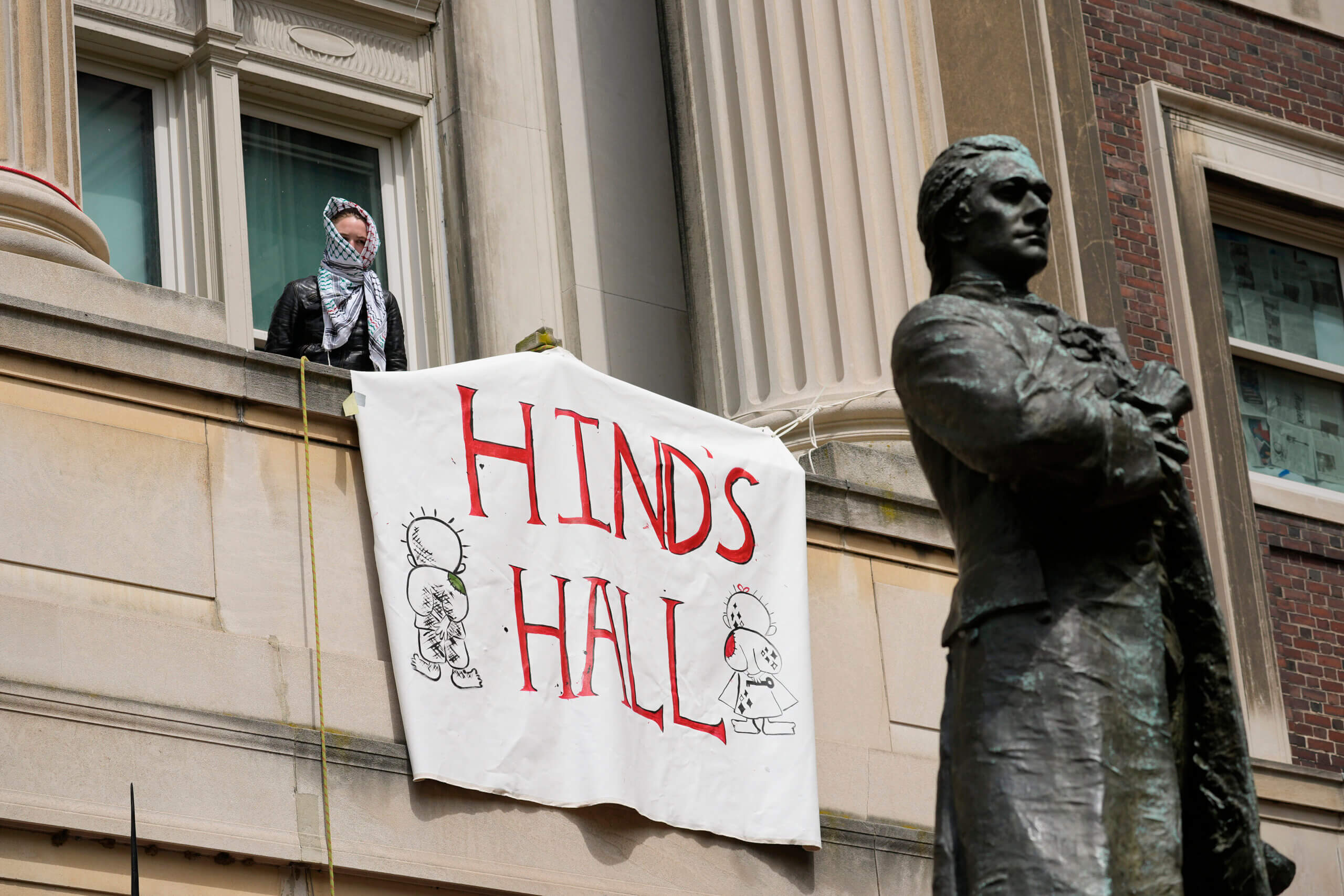
Columbia students, drawing on the school’s storied history of activism, took center stage during the protests, building an encampment that inspired dozens of others, and occupying a building. The university suspended protesters and twice called in the police, who arrested scores of them. During lockdowns of Columbia’s central quad, Spectator journalists, often cited by The New York Times and other outlets, kept the outside world current on the news inside the gates.
Klein, from the Spectator’s offices in Manhattan’s Riverside Church, selected, edited and published clashing views on the turmoil. She charged herself to be fair and empathic, and to sideline her own politics. But as she wrestled with writers’ intense emotions, she confronted her own — about her Jewish identity, the plight of Palestinians and what she described as Hamas’ “deeply horrifying” attack on Israel.
In the wake of that attack, she told me, she observed “a collective grief that I think was difficult to parse.”
At the same time, Klein worked with writers who called anti-Zionist Jews like her pawns of pro-Palestinian protesters — writers who, she felt, did not respect her Jewish identity.
“I found that very hard,” said Klein, a 21-year-old senior majoring in literature and philosophy. But she said she felt their arguments ”were fair to make” and had a place in the Spectator. She explained her own disconnection from Israel in a March essay for the Spectator entitled: “Antizionist Jews aren’t cosplaying Judaism—you are.”
Klein will graduate on May 15, though Columbia, citing the protesters, has canceled its main commencement ceremony.
She looks back on an intense year in which her academics and other extracurriculars took a back seat to her work on the Spectator, where she reviewed and edited hundreds of submissions about Israel and the protests. Some of those she published, she said, garnered tens of thousands of pageviews — about 10 times more than the usual audience for a Spectator essay.
“It was very kind of overwhelming,” Klein told me during a series of conversations. “But important.”
Welcome to Hillel?
Klein’s father was Jewish and died when she was 4. She was raised on the Upper West Side, in part by her paternal grandparents. Klein’s mother was a nondenominational Christian, but her father’s side of the family ensured she was converted to Judaism as an infant.
“They made it official,” Klein said. “My family was like, nah, we’re not gonna let that one slide.”
Klein was never a shul-every-weekend girl, but attended Hebrew school twice a week. Her grandfather in particular was involved in the local Jewish community and proud of the state of Israel, she said. Klein has visited Israel once — more than a decade ago, to celebrate her grandfather’s 75th birthday.

Klein said her mother studied the Middle East in college, learned Arabic and traveled in both Israel and surrounding Arab countries.
“I grew up with sort of two different perspectives on Israel and Zionism that I think, at least, encouraged me to think independently,” Klein said.
She attended the Bronx High School of Science and spent her first year of college at Wesleyan University before transferring to Columbia. She became an editor for Gadfly, the Columbia philosophy department’s magazine, and joined the staff of the Spectator as a trainee opinion editor, rose to associate editor, and junior year joined the section’s deputy board, which selects pieces for publication. Her peers then elected her editorial page editor.
Klein served in that role for a year, through the end of 2023, and remained on the deputy board once a new lead opinion editor took the reins in January.
She is now considering law school, but plans to take a gap year after graduation — a decision made in part due to the intensity of the last six months.
Klein said that she has long identified as an anti-Zionist because of Israel’s decades long occupation of Palestinian territories and the civilian death toll of its military campaigns. Her stance has made her feel unwelcome in mainstream Jewish institutions, and she said she has often heard, from pro-Israel Jews, that Zionism is fundamental to their Jewish identity. “Many of them argue that is true for all Jews — that anti-Zionist Jews aren’t really Jews and do not really belong to ‘the tribe.’”
That rhetoric, she said, “makes me really sad.”
Looking to get more involved in the Jewish community on campus, Klein reached out to Columbia’s Hillel during her sophomore year, and asked its director whether it would welcome someone with her politics.
His response, she continued, “was super fair and I think quite honest,” that there is space at Hillel for varying beliefs, but that Hillel is a Zionist organization.
In the end, Klein decided not to join — both because of her discomfort with Hillel’s Zionism, and out of concern for its members. Hillel was a place for community, Klein said, and she didn’t want to tarnish it with political conflict.
“For a lot of people Hillel is a safe space, and as much as I might disagree personally, I think having those spaces is hugely important,” she said.
Journalism under pressure
While Klein had never felt a deep connection to Israel, many of the people she cared about did — family, childhood friends and Columbia classmates.
So after Hamas’ attack, she decided to reach out to them, to better understand her own feelings and those of various groups on campus. Those were “productive” conversations, she said. They contrasted sharply with the vitriolic debate dominating Columbia.
The Oct. 7 attacks and Israel’s massive military response in Gaza prompted an influx of submissions from readers on campus and off, Zionist and anti-Zionist, moderate and radical. Klein had the final say over which essays and reader letters made it into print.
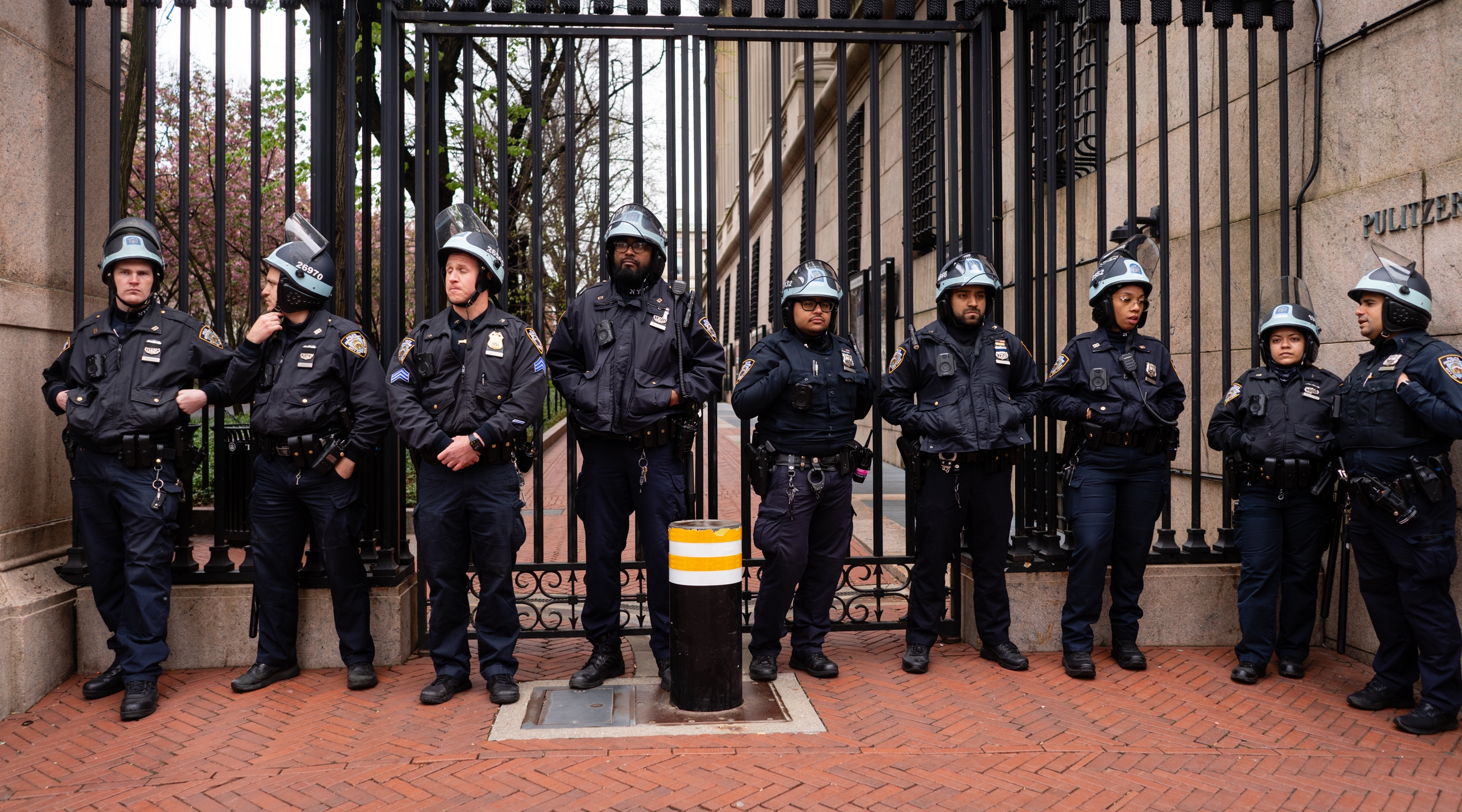
She said she tried to preserve writers’ arguments while editing out needlessly inflammatory language. She read submissions that called students in the pro-Palestine encampment “terrorists,” and some that crossed the line between criticism of Israel and attacks on pro-Israel students.
And she rejected pieces that denied what she considered others’ right to mourn, whether they grieved for strangers, or, as was often the case among members of the Columbia community, people they actually knew in Israel and Gaza.
“There are certain elements of student reactions, especially to Oct. 7, that people just simply shouldn’t try to critique or that are inappropriate to comment on,” she said. “Trying to interrogate that is wrong.”
Despite the pressure, Klein and her staff of about 15 editors and trainees kept the atmosphere collegial at the Spectator’s offices, though she still worried that the commentary in its pages could trigger a backlash that “would morally or at least personally fall on me.”
“I don’t think that ultimately happened,” she added.
In the encampment
No longer helming the opinion desk, Klein is willing to share her own views of the tumult on campus.
Some of the protesters’ behavior was unacceptable, she said, citing a sign held by a woman that read “Al Qasam’s Next Targets” next to a group of pro-Israel demonstrators — a reference to the Hamas’ military wing. But Klein added that other demonstrators had shouted the sign-holder down.
She also criticized what she described as alarmist messaging from both Columbia’s administration and politicians. A bevy of members of Congress descended on the university in recent weeks, including House Speaker Mike Johnson, to lambast the protesters and Columbia President Minouche Shafik, who they accused of failing to protect Jewish students.
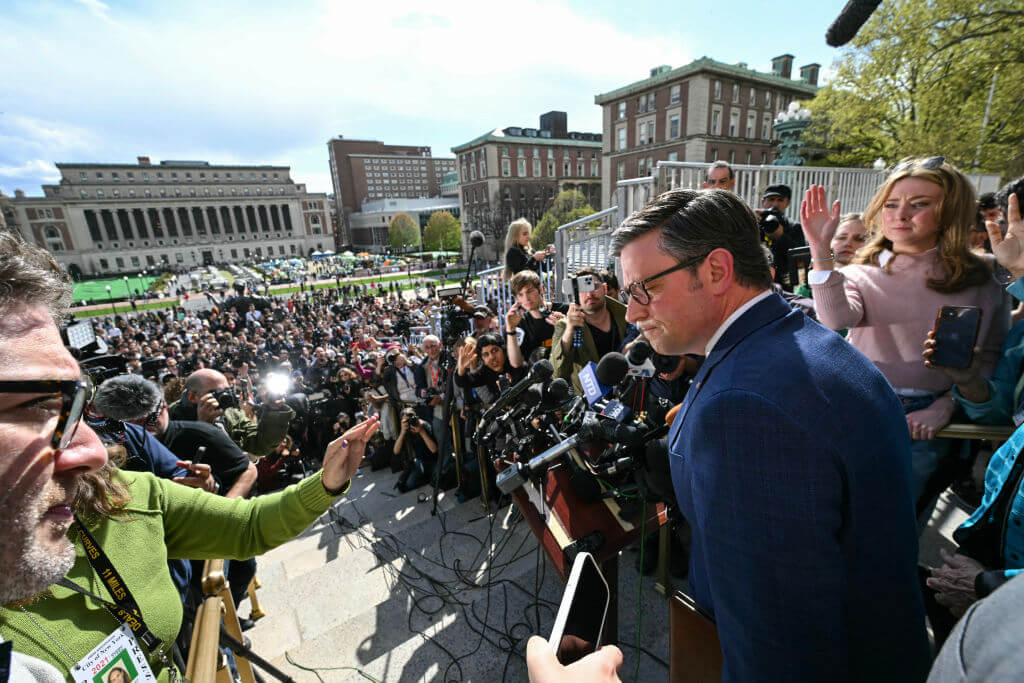
They stoked division and unnecessarily aroused panic, Klein said. Their rhetoric also hardened the protesters, she added, making them “much more dismissive of Jewish students’ legitimate and important feelings.”
Klein said she spent time at the protest encampment, which went up on April 17 and which the university tore down April 30, and experienced no antisemitism. She noted that protests included a sizable contingent of anti-Zionist Jewish students, and that they held a teach-in on antisemitism and hosted a Pesach Seder in the encampment.
She said she wanted other Jewish students at Columbia to know that “the vast majority of your peers on campus are not antisemitic; that is not the intent of what they’re doing.”
And she offered that she feels “quite religious” — more than she’s ever felt in her life.
With a group of close Jewish friends she celebrates holidays and attends Shabbat dinners. She is looking inward, she said, to reflect on the spiritual elements of Judaism that she took for granted when she was younger.
“I think Judaism is deeply beautiful. I think about it all the time,” Klein said. “This religion that was nursed in the cradle of civilization.”







